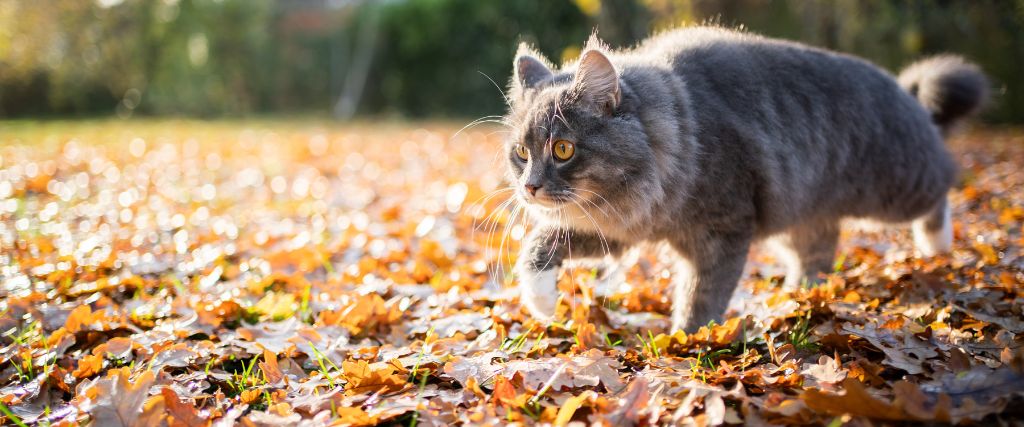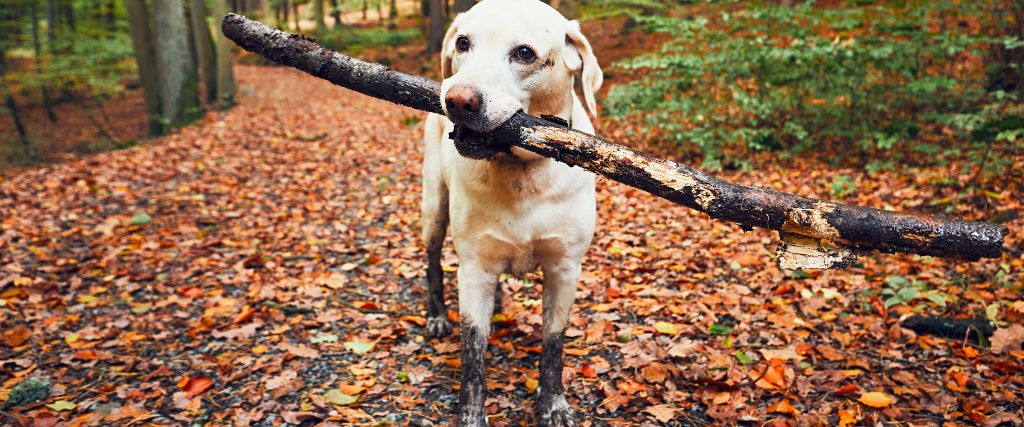With its crisp air, a kaleidoscope of colors, and pumpkin-spiced everything, autumn is undoubtedly a picturesque season. But as the temperatures dip and the days become shorter, we as pet owners must be well-prepared for the unique challenges this season presents.
From seemingly innocent treats to hidden outdoor hazards, autumn demands our vigilance and an extra layer of care to guarantee our pets’ continued well-being. As veterinarians, we’re here to help you keep your furry friend healthy and happy. That's why we'd like to share some of the most common fall pet dangers.
Tempting Treats: A Delight or Danger?
The arrival of fall brings an enticing array of treats that even our pets find irresistible. However, it's vital to note that not all autumnal indulgences are safe for our four-legged friends.
- Candy Corn and Sweets: Candy is a big part of Halloween, but keeping sweet treats far out of your pet's reach is important. Chocolate and xylitol, an artificial sweetener often found in sugar-free treats, can prove to be profoundly toxic for our furry companions.
- Pumpkin Spice Everything: While plain pumpkin is safe for pets in moderation, be cautious about added sugars and spices in "pumpkin spice" flavors that might potentially upset their delicate stomachs.
- Rich, Fatty Foods: Thanksgiving feasts are undoubtedly a delight, but it's crucial to exercise restraint when it comes to sharing fatty foods like turkey skin and gravy with your pets. These indulgences can trigger pancreatitis, a painful inflammation of the pancreas.
We recommend rewarding your pets year-round with treats specifically formulated for them and resisting the allure of sharing your seasonal snacks with them. Remember, a fleeting moment of joy for us could lead to a visit to the veterinarian for your four-legged best friend.

Navigating Outdoor Hazards
The breathtaking beauty of autumn can bring its own set of challenges for our animal companions when we decide to take them along with us on our adventures. Before embarking on your fall escepades, make sure you are aware of the following hazards:
- Toxic Plants: Some plants that flourish during the fall season can pose substantial risks if ingested by pets. Chrysanthemums, often found in fall gardens, and many species of mushrooms can induce symptoms ranging from mild gastrointestinal upset to severe health complications.
- Antifreeze: When cooler temperatures make an appearance, so does antifreeze, a liquid notorious for its sweet taste that attracts animals. Yet, this seemingly innocuous substance is extremely toxic and potentially lethal for pets. It’s crucial to ensure your pets are not exposed to spills or leaks.
- Ticks: While ticks might be less active in the cooler months, they are by no means absent. To protect your beloved pets from these nuisances and the diseases they can transmit, we strongly recommend keeping your pet up-to-date on veterinarian-recommended flea and tick preventatives.
- Leaves and Yard Debris: The appeal of jumping into piles of fallen leaves might be irresistible, but these leafy mounds can hide a multitude of dangers, including sharp branches, potentially harmful objects, or even toxic substances. Protect your pet by keeping them out of leaf and debris piles.
To guarantee your pet's safety when outside this fall, inspect your yard for potential hazards regularly. And while out on walks, keep your pet on a leash and steer clear of unfamiliar plants that could potentially pose a threat.
Chilly Weather Considerations
Our pets require extra attention to remain warm and snug as temperatures decline. Consider these tips to ensure your furry companions remain comfortable amid the autumn chill:
- Cozy Bedding: Creating a warm and comfortable sleeping space for your pets away from drafts is of utmost importance. Providing a soft blanket or bed can significantly contribute to their overall comfort while ensuring they don’t fall victim to autumn's chill.
- Pet Clothing: Breeds that are smaller or possess shorter hair may benefit from the added insulation of a well-fitted sweater or jacket, particularly during brisk outdoor strolls.
- Paw Care: The cold weather can be harsh on delicate paw pads. Utilizing paw balm or protective booties can shield their paws from both dryness and potential irritants.
Keep a close eye on your pet during cooler weather, especially when spending time outdoors. If you notice any signs of discomfort, such as shivering, reluctance to venture outside, or excessive paw licking, it's important to address these concerns promptly, as they could mean your furry family member is feeling the chill more intensely than you might think.

Fall Cleanup
Fall is a perfect time to tidy up and prepare your home and lawn for the coming winter months. If you aren’t careful, though, your cleanup activities could put your pet in danger. Here is some advice:
- Chemical Awareness: Many cleaning products, including bleach and certain detergents, are harmful to pets. Don’t use them around your pets, and be sure to store them out of reach. Consider switching to pet-safe cleaning products to keep your companion safe.
- Secure Trash: Our resourceful pets often find their way into places they shouldn’t — like trash cans. Secure your cans to ensure they don’t get into anything that could harm them.
- Noise and Stress: Vacuum cleaners and other noisy cleaning tools often cause stress in pets. Establishing a designated safe space to which they can retreat during noisy cleaning tasks can help alleviate their anxiety.
Closing Thoughts
As we revel in the splendors of fall, it’s important to remember that our cherished pets depend on us to safeguard their well-being. By equipping ourselves with an understanding of potential hazards and adopting a few simple precautions, we can ensure that our pets can enjoy the season with us. As veterinarians, we encourage you to embrace the beauty of fall while upholding your commitment to your pet’s safety. Take precautions to protect your furry friend, and don’t hesitate to contact your veterinarian if any problems arise. Together, you and your pet can enjoy autumn and all its splendor.
The Drake Center for Veterinary Care is an AAHA-accredited animal hospital located in Encinitas, CA. The Drake Center loves being a source of information for all pet owners across the country; however, if you have any questions regarding pet care and do not live in Encinitas, CA or surrounding cities, we encourage you to contact your local veterinarian.
